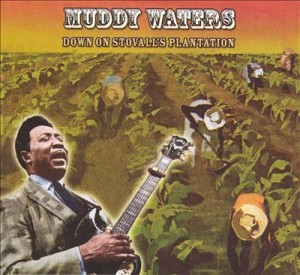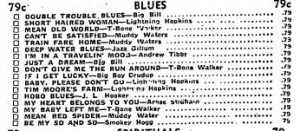As blues gained popularity through publication and performances it became blended with other types of popular music. Blues and rock music were obvious candidates for combination, both drawing on folk instrumentation and sharing similar subjects. In Chicago, which was a hotbed of blues music when many black musicians migrated to Chicago to leave the South. Possibly the most influential musician of the blending is McKinley Morganfield AKA Muddy Waters. Waters got his start at home in Mississippi when Alan Lomax traveled there on behalf of the Library of Congress in 1941 and again in 1942. Waters was later released on the album “Down on Stovall’s Plantation” from these recordings.
 This recording shows us that Muddy Waters is a legit player of the blues from the south and would be taken seriously by white audiences in the North.
This recording shows us that Muddy Waters is a legit player of the blues from the south and would be taken seriously by white audiences in the North.
In 1943, shortly after Lomax’s visit, Waters moved to Chicago in hopes of making it big as a blues musician. As Muddy Waters made his way as a blues performer he made with friends with Big Bill Broonzy who helped Waters become popular. This article from Cultural Equity highlights some of the connection between Muddy Waters and Big Bill Broonzy. Muddy Waters was put on singles in the late 40s and through the 50s in Chicago.  Waters gained popularity from recording Robert John tunes who had been on the blues mind since 1938 from the “Spirituals to Swing” concert in New York (Here’s a short RadioLab episode about this concert and Robert Johnson, it’s great!).
Waters gained popularity from recording Robert John tunes who had been on the blues mind since 1938 from the “Spirituals to Swing” concert in New York (Here’s a short RadioLab episode about this concert and Robert Johnson, it’s great!).
Muddy Waters became very popular in Chicago and was seen as a performer who was keeping the folk in the blues and rock that he was performing. Because he had such a close connection to the south and his history there. The Defender wrote an article to this effect in 1972. Muddy Waters keeps alive an Afro-American culture

Great job bringing to life a performer that we didn’t get to talk about! I especially appreciate your many links to outside sources of information–readers can connect to other sources easily (Radiolab is awesome).
Something interesting that you mentioned, but didn’t flesh out: “Muddy Waters is a legit player of the blues from the south and would be taken seriously by white audiences in the North.”
I wondered about this–why would he be taken seriously by white audiences? Would audiences listen to his music casually? Would musicians try to emulate his style?
Just some things to think about!
Nice work here, G! I wish we had had time to talk about Muddy Waters in class, but given that we didn’t, I’m glad you talked about his career here. As you note in your title, more than Big Bill Broonzy, more than Robert Johnson, Muddy Waters helped link Delta blues and what we now think of as “Rock” (in fact, his British tours were extremely influential in the formation of blues revival bands there like the Beatles, Cream, the Rolling Stones, and Led Zeppelin).
You cited Cultural Equity, which is Alan Lomax’s website (or I guess the website of his estate now). I don’t doubt the information you found in the article on Big Bill Broonzy, but in the future you might consider mentioning in your own prose that you’re relying on a website (or book or CD liner notes or whatever) of a figure with a particular stake in the history that figure is writing. Often just writing “According to an article on Cultural Equity, a website Alan Lomax created, …” is enough to tell your reader that they should be healthily skeptical of what they’re about to read.
I also wonder what you think of that album cover you shared: Muddy Waters holding an electric guitar, superimposed on a painting of field hands working the soil . . . that’s quite a juxtaposition, don’t you think?